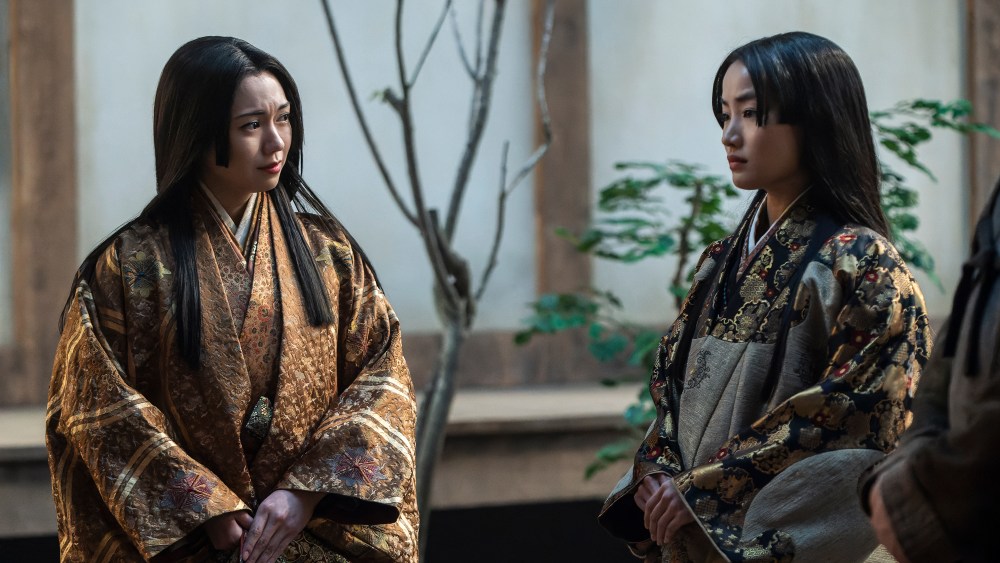When the “Shogun” team gathered in a Washington, D.C. hotel room last February, champagne in hand, counting down to the show’s global release, producer Miyagawa Eriko wrestled with the TV settings and watched the clock tick toward launch. “That moment when something you’ve poured years of your life into finally goes out into the world, I thought, perhaps this is what feels like to send a child off to college, that mix of pride, terror and love,” she recalled during her keynote address at the MPA seminar at the Tokyo International Film Festival.
The emotional moment came as the culmination of a full-circle journey for Miyagawa, who had returned to D.C. to screen episodes at MPA headquarters just before the series launched. For the Yokohama native who graduated from Georgetown University in 2002, the nation’s capital represented where her “international adventure began.” Twenty-two years later, she was back presenting “a Japanese jidaigeki, a period drama born of genuine cross-cultural collaboration.”
The event took on added significance when a deputy chief of mission at the Embassy of Japan shared how the original 1980 “Shogun” miniseries had become an unexpected diplomatic tool when he was a teenager living in the U.S. “Americans were captivated by stories in a faraway land with unfamiliar customs and codes,” Miyagawa recounted. “Many of his classmates had a crush on Shimada Yoko.”
The anecdote resonated with Miyagawa’s own childhood experience of cross-cultural connection. When her family moved to Dubai for her father’s work, she befriended a Dutch neighbor girl despite sharing no common language. “One day, my father put on the VHS of ‘Alice in Wonderland.’ I remember sitting side by side with that girl giggling at the Mad Hatter’s unbirthday party. We didn’t need words, we just needed story,” she said. “That small moment of connection stayed with me and became, I think, the seed of everything.”
Miyagawa’s career trajectory reads like a masterclass in bridging Hollywood and Japanese cinema. Her first job out of college was translating on the set of “Kill Bill: Vol. 1,” where she was stunned by the scale and international collaboration. “The crew came from all over the world — U.S., Japan, China, Hong Kong, Australia, Canada. It was a beautiful chaos, and I felt completely at home,” she said.
Working on Martin Scorsese’s “Silence,” a passion project decades in the making, proved formative. Traveling with the legendary director to Nagasaki, Miyagawa was struck not by his fame but his humility. “Despite being an auteur, he approached the material like a student. He surrounded himself with historians, priests and cultural advisors, not to verify facts, but to seek understanding. He listened, he asked and kept asking. And that openness, that curiosity, stayed with me.”
When Miyagawa joined FX’s “Shogun” after “Silence” was released, the timing proved prescient. The series, based on James Clavell’s 1975 novel previously adapted into the 1980 miniseries, found passionate champions in FX leadership John Landgraf and Gina Balian, who brought on co-creators Justin Marks and Rachel Kondo to reinvent the story for contemporary audiences.
“In one acceptance speech, Justin joked that he still couldn’t quite believe FX had greenlit a very expensive subtitled Japanese period drama whose central climax revolves around a poetry competition,” Miyagawa said.
While many applauded FX for taking such a gamble, Miyagawa prefers a different framing. “I like to think of John and Gina as reading the direction of the wind, waiting for the right moment and striking. The timing was remarkable. COVID accelerated the rise of global streaming. Audiences became more and more adventurous, willing to read subtitles, hungry for good stories, wherever they came from.”
That shift brought deeper responsibility toward authenticity, which Miyagawa described as “a process, one that requires patience, curiosity and respect. Every hairstyle, every sleeve pattern, every historical gesture, was discussed in English, discussed in Japanese, and often returned to English again. Every line of dialogue was translated, polished, retranslated, repolished by writers, translators, historians, playwrights, producers and actors.”
The production became its own cultural conversation. “If you visited our set, you would have seen crew from five continents, sharing bento and donuts, carefully wearing food covers so as not to damage the county lands. We weren’t just making a story about cultural exchange. We were living it.”
Reflecting on her career, Miyagawa revealed: “I’ve realized something — I’ve never worked on a show that didn’t require translation. My entire career has been one long experiment in translation, not just of language, but of worldview. From ‘Kill Bill’ to ‘Silence’ to ‘Shogun,’ I’ve lived at the crossroads where Hollywood ambition meets Japanese precision and where misunderstanding, treated kindly, can turn into magic.”
Asked about creating epic storytelling, Miyagawa rejected the expected answers about budgets and scale. “The truth is, I think an epic story isn’t about how big we can make something. I think it’s about how many hearts it can belong to. Every true epic story I’ve been part of began the same way, with people from different worlds meeting in the same creative space, figuring out what the common language is, finding the story they’re trying to tell — curiosity, empathy and courage.”
Though “Shogun” could not be filmed in Japan due to logistical reasos, Miyagawa hasn’t ruled out the show returning to the land where it is set for future seasons.
She concluded with a rallying cry: “Let’s keep making the kinds of stories no single culture could imagine alone.”
